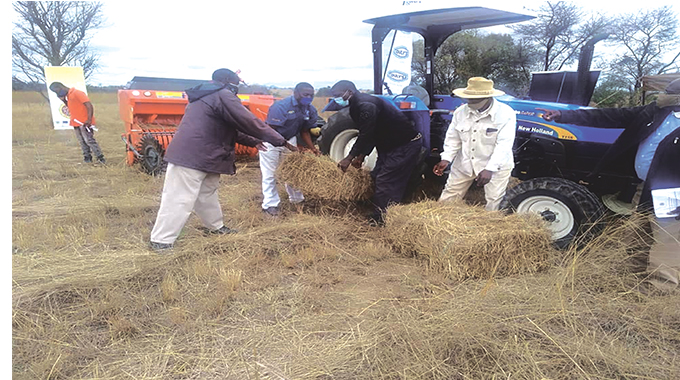Insiza farmers champion fodder harvesting model
FARMERS in Insiza District in Matabeleland South Province have established a fodder production and harvesting scheme to strengthen their capacity to adequately feed livestock and increase the value of their earnings from sales.
Recurrent droughts due to climate change have in recent years left most communal farmers exposed to risks of starvation and loss of livestock due to depleting pastures. This has seen most smallholder farmers, especially in the southern region of the country, grappling with the grim effects of losing their only source of wealth, as herds continue to be wiped out.
In the context of rising costs of stockfeed in the formal markets, there have been growing calls to build capacity and resilience of smallholder farmers so as to preserve the national herd. Insiza District is one of the livestock hubs in the province but has suffered reduced pastures over the years, especially on the communal southern parts while the north, which is made up of large commercial farmland, has an abundance of grassland.
In response to this challenge, a total of 16 agriculture development associations representing about 4 000 farmers in Insiza District, have come together to form what is known as the “Insiza District Resilience Building Trust (IDRBT)”, which has started implementing the feed harvesting project with the help of development partners.
The intervention enables strategic timing of harvest and baling of large volumes of natural grass from areas with surplus to feed livestock during dry periods.
Stakeholders from agriculture-biased Government departments such as Agritex and the veterinary services together with representatives from skilled personnel, are the advisory council of the new trust.
The IDRBT and its fodder production and harvesting sustainable model was officially commissioned at St Theresa Farm on Wednesday. In order to strengthen the capacity to harvest and bale hay, the trust received mechanisation support in the form of a brand-new Holland tractor, baler, mower, rake and a trailer. The equipment was sourced from Duly Holdings Limited; a local supplier of farm implements and motoring accessories, through the support from the Zimbabwe Resilience Building Fund (ZRBF).
Under the programme, farmers are also being equipped with skills to harvest fodder legume crops, processing and storing these for use during periods of scarcity. This also includes collecting and storing tree pods and stover as well as creation of community managed feed warehouses.
During the commissioning event, a mock fodder harvesting and baling exercise was conducted by the local IDRBT team in the presence of Agritex and veterinary experts, ZRBF lead agency — Danish Church Aid country director, Mr Mads Schack Lindegard, implementing partner, Sizimisele Action Resilience Zimbabwe programme manager, Mr Diego Mutsvange and his team, Duly Holdings executives and local farmers.
IDRBT chairman, Mr Honest Msipa, said the trust has received huge support from the Government and development partners and pledged that they would work hard and show good results.
“The trust has been registered legally and we have now operations, administration and finance departments. In the next few years, we expect this business to grow and create more employment for Insiza.
“Our vision is to grow big and acquire more assets to support the livestock value chain and ensure our members gain higher earnings. We look forward to employing a project manager,” said Mr Msipa.
He said the trust was looking forward to reaping a huge dividend taking advantage of the growing demand for stock feed in the province. At the moment farmers in Insiza source the bulk of the feed from Bulawayo, where a bale of hay costs about US$3 with farmers having to factor in transport costs.
As a technical player and equipment supplier, Duly Holdings marketing manager, Mr Rutendo Chabururuka, said the company has spotted a niche in partnering for support towards capacitating smallholder communal farmers.
In his remarks Mr Lindegard said Insiza farmers should utilise the support extended to them to grow their livestock business and prove to the rest of the country that farming is a sustainable business. He challenged the trust to run its operations as a profit driven business and to wean itself off from future dependency.
“Please approach this journey from a business perspective, grow your operations and be independent. Take care of this equipment,” he said.
Similar feed harvesting models could assist the entire Matabeleland South province, which had lost about 15 595 cattle early this year due to drought, according to the Department of Agricultural Technical and Extension Services (Agritex).
The biggest number of deaths at that time were recorded in Beitbridge District with 4 403 while Bulilima had lost 2 697, Gwanda (2 569), Mangwe (1 434), Insiza (2 367), Matobo (1 736) and Umzingwane (390). Matabeleland North had lost over 600 by November last year. The figures could be higher by the end of this year.-chronicle.co.zw










